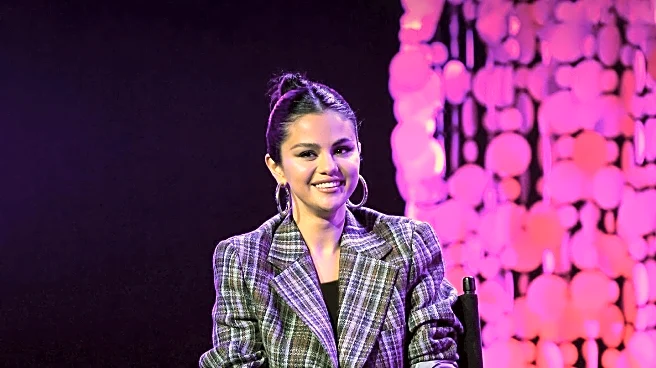What is the story about?
What's Happening?
Selena Gomez has been spotted wearing a pair of almond-colored Mary Jane shoes, which are currently available for purchase at a discounted price of $118. These shoes, known for their comfort and style, feature arch support and an adjustable instep strap, making them a practical choice for everyday wear. The shoes are machine washable and sustainable, adding to their appeal. Gomez's choice of footwear aligns with her recent fashion trends, as she has previously worn other products from the same brand, VIVAIA. The shoes are available in various colorways, including mesh and pearl-embellished options, and can be purchased from multiple retailers such as Amazon and Nordstrom.
Why It's Important?
Selena Gomez's endorsement of these Mary Jane shoes highlights a growing trend in affordable and sustainable fashion. Her influence as a celebrity can drive consumer interest and sales, benefiting both the brand and retailers. The focus on comfort and sustainability reflects broader shifts in consumer preferences towards practical and environmentally friendly products. This trend could encourage other brands to prioritize similar features in their offerings, potentially impacting the fashion industry's approach to product design and marketing strategies.
What's Next?
As Selena Gomez continues to influence fashion trends, it is likely that more consumers will seek out similar products that offer both style and comfort. Retailers may respond by expanding their inventory of sustainable and affordable footwear options. Additionally, other celebrities might follow Gomez's lead, further promoting the Mary Jane shoe trend. The fashion industry could see increased collaboration with influencers to boost product visibility and sales, particularly in the sustainable fashion segment.
Beyond the Headlines
The promotion of sustainable fashion by high-profile figures like Selena Gomez could have long-term implications for the industry. It may lead to increased investment in eco-friendly materials and production processes, as brands strive to meet consumer demand for sustainable products. This shift could also influence cultural attitudes towards fashion consumption, encouraging more mindful purchasing decisions and reducing the environmental impact of the industry.
















